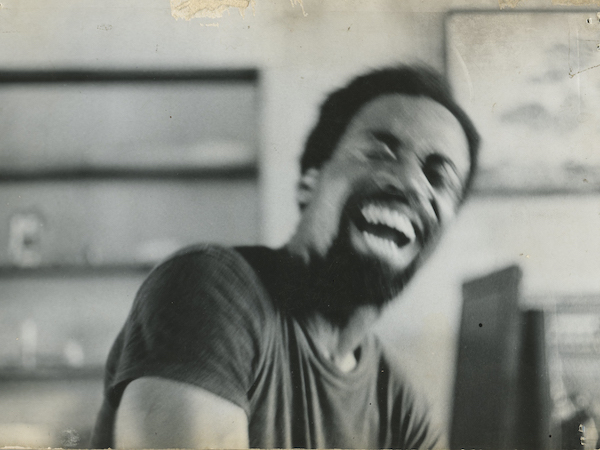Jan 13, 2026 2:09 PM
More Trump-Kennedy Center Cancellations
The fallout from the renaming of the John F. Kennedy Center for the Performing Arts to include President Donald…

After performing with John Coltrane, drummer Rashied Ali (shown here) started Survival Records with saxophonist Frank Lowe during the early 1970s.
(Photo: Courtesy Survival Records)Although the legendary jazz drummer Rashied Ali is best known for his work as one of John Coltrane’s pathbreaking late-career collaborators, his next steps after Coltrane’s abrupt passing in 1967 also are rich with creativity. A central node in the New York loft scene through his stewardship of Ali’s Alley, the drummer also co-founded Survival Records with saxophonist Frank Lowe in the early 1970s.
Just over a decade since Ali’s passing in 2009, Survival has been revived under the supervision of the drummer’s family. Two new reissues—Ali and Lowe’s Duo Exchange: Complete Sessions and the Rashied Ali Quintet’s First Time Out: Live At Slugs 1967—are available as limited-edition double-LP vinyl sets, as well as digitally via Bandcamp. Both recordings are a beginning of sorts for the label, and each is full of remarkable musical activity: Duo Exchange was the imprint’s first release, and First Time Out documents Ali’s first performance as
a bandleader.
After both musicians had earned a reputations as key sidemen for avant-garde jazz projects, Ali and Lowe started Survival Records to release their first album as co-leaders; it was recorded in fall 1972 and released the following year. The album uses the expressive drums-and-sax duo format that Ali had honed with Coltrane—but before it had received wide acclaim when Interstellar Space was released
in 1974.
One benefit of the small-group format is that listeners have ample time to hear Ali’s full range of drumset capabilities—during the solos, especially, he flourishes as an improvising storyteller. Lowe, too, takes full advantage of the solo spaces, unleashing everything from screams and howls to Sonny Rollins quotes. Although the album would be worthwhile if it only included the solo sections, these two are at their best playing together, conveying intimacy and creativity as they share energy and draw from one another’s ideas.
This double-LP includes previously unreleased outtakes that help frame the full process that went into making the original album. The alternate takes of “Exchange Part 1, Movement II” are especially instructive in getting a sense of the shared understandings that underpin the pieces. And the warmup fragments that open the “D” side of the album—each performer making a powerful skronk that tests whether the engineer is ready and able to record—make it clear that these guys came to play.
After releasing Duo Exchange, Ali took primary responsibility for stewarding the label, turning toward his own back catalog. First Time Out is the first item in this archive, documenting a May ’67 date of Ali’s at the renowned East Village club Slugs.
The bandleader’s drum solos are absolutely gripping throughout; each time his number is called, he shifts effortlessly from an energetic accompanist into a sharp, dynamic tone poet. Ramon Morris, a tenor saxophonist best known for his later work on the Groove Merchant label, shows energy and endurance throughout. Pianist Stanley Cowell is low in the mix but always consistent; listeners who only know his playing through his work on the Strata-East label might be surprised by some of his far-out excursions. But Dewey Johnson’s lyrical interpretation of “Ballade” is a powerful surprise, to which Ali and the trumpeter offer emotive underscoring as an attentive rhythm section. Reggie Johnson’s bass solos also stand out for their virtuosity, presence and originality.
The purposeful and heartfelt quality that the ensemble conveys is a striking testament to the generative edge that can result from the right combination of open-eared musicians and loose, spacious compositions—which became Ali’s calling card. And in keeping with the “energy music” aesthetic of the loft scene, the musicians really go for it during the open spaces that highlight featured soloists.
Unfortunately, the full performance wasn’t documented—the tape cuts off abruptly amid a captivating bass solo on “Study For As-Salaam Alikum,” just as Ali begins to take over. But there’s more than enough tape here to get a sense of the powerful free-jazz movement that was beginning to flourish in Manhattan. DB
This story originally was published in the May 2020 issue of DownBeat.

Belá Fleck during an interview with Fredrika Whitfield on CNN.
Jan 13, 2026 2:09 PM
The fallout from the renaming of the John F. Kennedy Center for the Performing Arts to include President Donald…

Peplowski first came to prominence in legacy swing bands, including the final iteration of the Benny Goodman Orchestra, before beginning a solo career in the late 1980s.
Feb 3, 2026 12:10 AM
Ken Peplowski, a clarinetist and tenor saxophonist who straddled the worlds of traditional and modern jazz, died Feb. 2…

The success of Oregon’s first album, 1971’s Music Of Another Present Era, allowed Towner to establish a solo career.
Jan 19, 2026 5:02 PM
Ralph Towner, a guitarist and composer who blended multiple genres, including jazz — and throughout them all remained…

Rico’s Anti-Microbial Instrument Swab
Jan 19, 2026 2:48 PM
With this year’s NAMM Show right around the corner, we can look forward to plenty of new and innovative instruments…

Richie Beirach was particularly renowned for his approach to chromatic harmony, which he used to improvise reharmonizations of originals and standards.
Jan 27, 2026 11:19 AM
Richie Beirach, a pianist and composer who channeled a knowledge of modern classical music into his jazz practice,…